VERSUS: Body Count vs. Rage Against The Machine
Welcome to Versus. The series where we look at two albums in metal history, compare them to each other, and

Welcome to Versus. The series where we look at two albums in metal history, compare them to each other, and see which one was the better record.
In this edition of Versus, we are traveling back to the year 1992. A year that was infamous for the Rodney King trial, that a not guilty verdict towards the Los Angeles Police Department on police brutality charges, led to the L.A. riots. Lasting for six days, with 63 people being killed, over 2,000 people injured, 12,000 arrested and over $1 billion dollars in damages. A time where politics and war across the world became prevalent all across news outlets. Also during that time, two bands would begin to rise in prominence and help push the rise of "rap metal" at the time of their releases. Becoming pre-cursors or inspirations to the nu metal movement that would rise later in the decade. One band, featuring a famous west-coast rapper as its front man, would rise to controversy with their debut album due to one song. The other, a political-driven four-piece that pushed politics through their rap and unmitigated live performances, while also reimagining the way the electric guitar can be played. Batten down the hatches, and duck for cover in this matchup I'm calling "The Real Battle of Los Angeles".
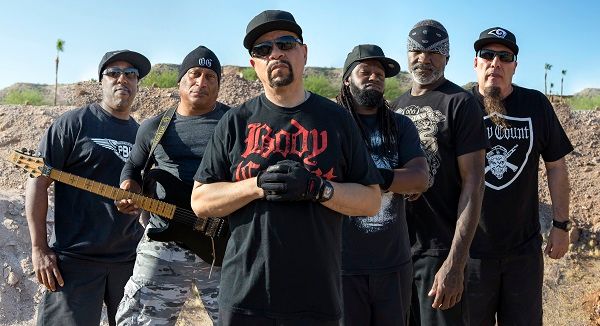
In this corner, we have Body Count with the band's 1992 self-titled album. Rapper Ice-T formed the project due to his love of rock music. The album dealt with heavy lyrical topics like drug abuse and police brutality. The album features the band's most famous/infamous song "Cop Killer" which drew a huge amount of heat and backlash from law enforcement. With actor Charlton Heston famously reading the lyrics to the song at a press conference. Let's dive into this landmark release in not only the band and Ice-T's career, but look at the cultural impact and heaviness the record delivered at the time.
After the short interlude/skit "Smoked Pork", the album officially kicks off with "Body Count's in The House". Guitarists Ernie C & D-Roc's chugging, palm muted riff, transition into a simple drum groove by Beatmaster V. Throughout Ice-T saying the band's name over and over, the nice guitar solo segue definitely has a nice thrash sound as Ice-T sings the song's title. The song is basically a hype-up kind of song, with Ice-T introducing the band members as the drums create a nice bouncy groove. Simplistic in nature, but it builds up the hype with the violence, gun shots and cars peeling out interspersed within the main riff.
The next track, following another music break/skit "Now Sports" is "Body Count". Opening with an almost "Stairway To Heaven" opening guitar vibe. Ice-T delivers a self-reflective spoken word section over it, before his shouting into Mooseman's bass groove and guitars turn the song into a driving punk song. With the drumming giving that fist-pumping feeling with every snare hit as Ice-T delivers a Black Flag-esque vocal delivery. Beatmaster V delivers a pretty darn jazz-influenced complex drum fill, before the chorus at the halfway mark. Then, the song slows down to a trippy, 70's style guitar lead and drum/bass groove combo. Before the band returns to the hardcore punk riff and drums as Ernie C delivers a pretty impressive guitar solo over the heart-pumping drums.
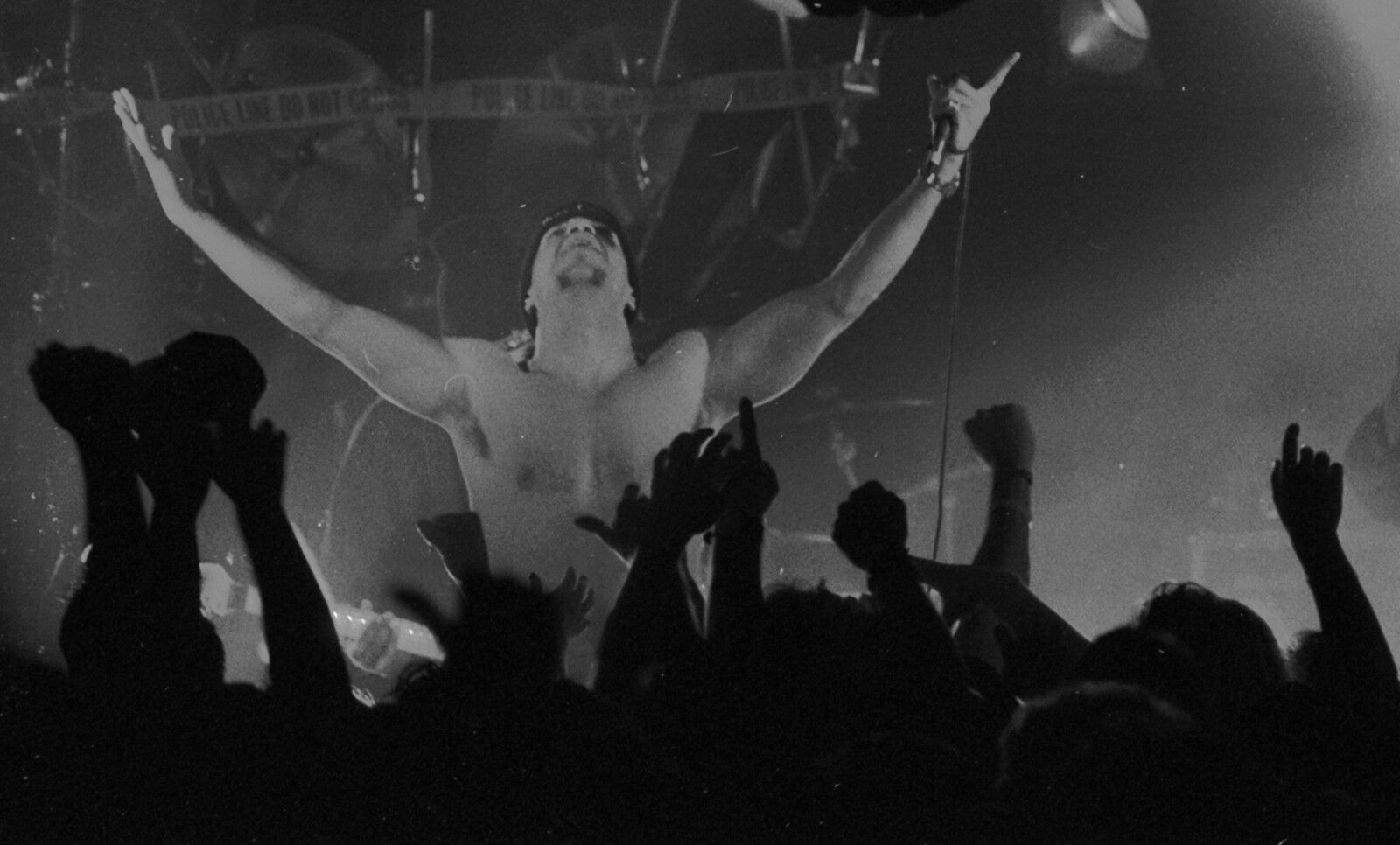
After another short skit "A Statistic", "Bowels of The Devil" opens with ringing guitars that mimic Dead Kennedys in the build as the cymbals build anticipation. Very crossover thrash in the guitar playing, reminiscent of D.R.I. and Suicidal Tendencies. I love Ice-T's combination of rap meets punk delivery on the album. Almost matching the hostility of his rapping and his lyrics, with the hostility and aggression of Henry Rollins. His voice matches the album's punk/crossover attitude, especially with Ice-T's commanding presence. The band is also commanding in the playing. Especially Ernie-C, who from my history of knowing the band, is a truly underrated guitar player and shredder.
"The Real Problem" segues into the hostile and high-octane "KKK Bitch". Channeling punk rock roots of the L.A. scene, Ice-T leads the charge as the drum and bass add a bit of attitude to the vocal cadence. The "ah" sing along parts, delivers that swagger and attitude before the drum/bass groove comes back on the verse. True punk rock in the delivery and lyrical message. With Ice-T not giving a damn what the listener thinks, and doesn't care if you get offended by the band's lyrics and music.
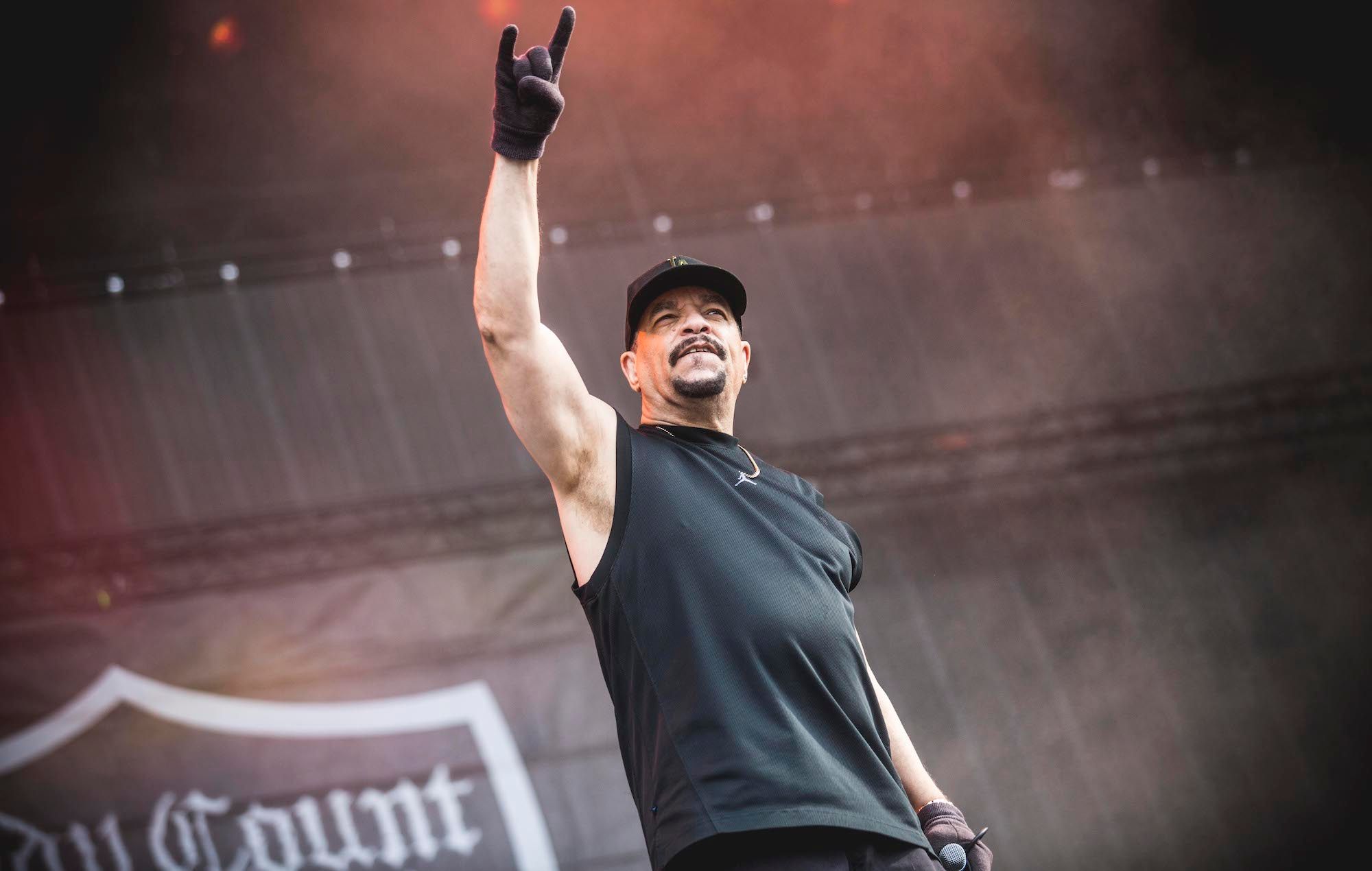
"C Note" opens with a nice, ballad-esque clean guitar tone. Rising and piercing electric guitar cascades over the somber, almost lullaby sounding guitar. A nice instrumental piece in its simplicity, before ending with a short neoclassical flurry of shredding.
"Voodoo" opens with a war-like drum and guitar riff combination. Ice-T's vocals are more ominous in an almost spoken word delivery. The riff is grimy and gritty as his vocals are so brooding and dark in nature. Dabbling in horror punk with the lyrical themes and musical direction, the song's pacing picks up to a more thrash-level pacing. I was headbanging along with the snare hits as the riff instantly has that Bay Area thrash sound in the play style.
Another relaxing acoustic guitar passage opens "The Winner Loses". Bass and drums come in loud-and-clear behind the clean guitars. Ice-T sings about the problems with drug abuse and addiction. I do like his vocal harmonies on the song. As the song almost is a dark, eerie spin on the power ballad, but way darker and bleaker in nature and tone. Cryptic in nature and hopeless in emotion and empathy, the song is the longest song on the album at being over six and a half minutes long. Musically, I love the song. With each member of the band getting moments to shine or stand out. With Mooseman getting a nice bass lead, just as Ernie-C wails and delivers belting guitar leads, just as the drums start and stop in a progressive metal nature.
The album's lead single, "There Goes The Neighborhood", opens with a hardcore sounding guitar opening before Ice-T kicks off the song by shouting the song's title. The band delivers a very Biohazard sounding riff as the song's high-octane aggression kicks in. A heavy as all hell riff, with lyrics that white people might be afraid to sing live, the song's aggression and hostility kicks into double-time. With the guitars and bass delivering that punk/hardcore aggression, segueing into a clean, tapping-like guitar lead by Ernie-C. Ice-T delivers an aggressive, not giving a damn attitude and swagger in his lyrics as a guitar solo sweeps over the tapping section as drums begin to add a groove to the guitar lead. Beatmaster V gets another Buddy Rich style drum solo, before the band goes for the jugular for one last hit before the song closes.
After a transitional skit "Oprah", the dark theme of male promiscuity starts "Evil Dick". With a call-and-response feeling opening, that I can picture GWAR doing, it has Ice-T belting out "the evils of male promiscuity" in an almost funk/punk hybrid with the guitars and drums. To be honest, the song is ok in my opinion. It sounds like the band took a GWAR song/theme/idea and added a more gangster aesthetic. It's still a good song, and the music is heavy and fast especially near the end, but again, it just makes me think that this would be better with Oderus Urungus doing it then Ice-T.

"Body Count Anthem" has a very heavy, Slayer-like build. Picturing the crowd chanting along the band's name along with Ice-T as the riff intensifies. With similar vibes to the album's opener, its more of a hype builder kind of track, until the halfway mark. Then, the drums get more aggressive and faster. With the guitars and bass following along, with the pace as the impactful playing and driving riff, crosses the finish line in an instant bob along feel to the snare hits.
"Momma's Gotta Die Tonight" has a gritty, nasty sounding opening riff. I love the drums, playing a doom metal playing style. The riff instantly made me headbang along as Ice-T delivers spoken word vocals before shouting the last word of the verse. The slow down to a crawl at the quarter mark, creates that evil, uneasy feeling as you can picture Ice-T having a battle in his head. Especially with the vocal reverb and delay as he has that internal conflict as the drums and riff begins to pick the pace up. Before hitting the brakes, bringing that internal battle back as Ice-T begins to realize the dark side is winning as the song progresses. With his maniacal laugh, escalating to evil and horrible thoughts and actions.
Following the closing sketch "Out in The Parking Lot", comes the album's controversial closing track "Cop Killer". With a high-energy thrash/crossover riff, the drums deliver that punk pulse as the riff is just a barrage of anger as Ice-T kicks in with the vocals. Delivering controversial lyrics about violence against police, the chant-along chorus has that punk aggression of Henry Rollins with the lyrical political weight of Jello Biafra. I do like the gunshot effects syncing up with the snare hits as it heads into the chorus. Uttering the great rap group N.W.A. shouting "Fuck The Police", the song heads into a pretty thrashy and technical guitar solo. With the drums keeping tempo as the crowd chants along, as the bass comes back as drums build up. Ice-T leads the crowd in the palm of his hand as the song delivers one last chorus and lyrical onslaught on the police as the album comes to a thundering close.
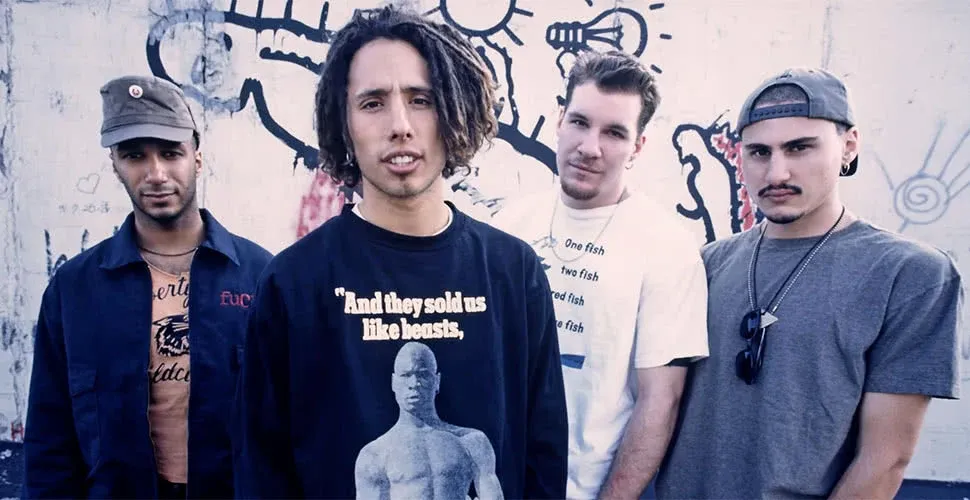
Their opponents are fellow L.A. act Rage Against The Machine with their 1992 self-titled album. Led by the political and almost anarchistic lyrics and vocals of Zach De La Rocha, and the unique and experimental guitar playing of Tom Morello. The album would become a groundbreaking record and one of the pinnacle releases in the rap metal genre. Led by the album's controversial cover of a monk committing self-immolation, the album's ferocity and pure aggression was a punch to the throat and then grabbed you by it upon release. Even landing on Rolling Stone's list of the 100 Greatest Metal Albums of All Time at Number 24.
An opening, intricate guitar riff with bass gurgles opens "Bombtrack". Rising drums build behind it before Zach De La Rocha delivers that trademark "ugh" before the bouncy, groovy riff comes in HARD. With a great rhythm section of drummer Brad Wilk and bassist Tim Commerford that create that reliant, heavy pre-nu metal rhythm section. De La Rocha's delivery of the word "Burn" just has so much anger and intensity in his delivery. Tom Morello's groovy, wailing guitars, especially with the bend before the chorus, just truly adds to the weight of the track when the chorus hits. Morello delivers a short guitar solo, before the chorus comes back more ferocious. With the second chorus showing Morello begin to show his creative guitar playing as the song ends with an impactful thud.
The album's most well-known song "Killing in The Name" is next up. With it's ringing bass and guitar strums, before Commerford gets a nice bass lead emphasized with cowbell. Wilk delivers that groovy, in-the-pocket drum section as De La Rocha delivers the song's title and the song comes in like a wrecking ball. With it's repetitive verse section and chorus, it truly lets the guitar add that edge to the song as it heads into the chorus. Matching guitar and drum strikes head into the middle section of "Now They Do What They Told You". An earworm guitar hook over that section, transitions back into the main verse riff at the halfway mark. Then, comes up the uncontrollable, pent up build up as Wilk goes crazy all over the drum kit. De La Rocha's delivery on that section just has so much anger & pissed-off energy. And his delivery of "mother fucker" is probably one of the best deliveries of that phrase I've ever heard as the song concludes.
"Take The Power Back" opens with a subtle build with bass strikes, before slap-bass and rising guitar wails and subtle drums build anticipation. As the main riff comes in and the bass pops underneath it, it just hits so damn good before the verses. Truly creating that groove combo, with Wilk keeping that anger and groove with the in-the-pocket drumming. Guitars lead the charge on the chorus, ringing in the ether of the mix and are the transition amongst the bass gurgles heading into the second verse. De La Rocha spits with such power and presence in his delivery, commanding his army just as he yells the song's title. The opening groove returns again, before Morello gets a jarring, but impressively fast guitar solo with bass pops underneath. I also love how De La Rocha has such power in his vocals and command of the band for the closing quarter mark. Leading the band from side to side in the mix and production.
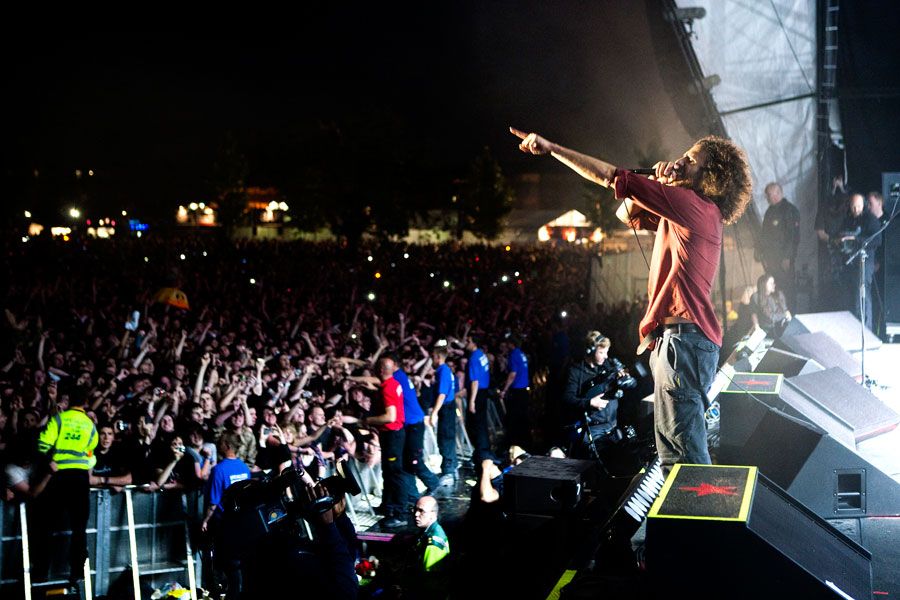
A very somber guitar and wailing feedback opens "Settle For Nothing". Drum cymbal strikes cascade over both. The spoken word vocals begin to rise in temper, as the drums and guitar come in dark and nasty in the playing. Wilk delivers a slow, but heavy drum section as the build descends back to the opening vibe. De La Rocha shreds his voice heading into the chorus in his pissed off energy. After the halfway mark, we get a short burst of technical guitar playing by Morello as the bass plucks ring above the guitar playing. As reverbed drum strikes echo in the mix. The alarm-sounding guitars over a thundering drum and bass combo truly closes out the song in an uneasy, but tense-filled conclusion.
"Bullet in The Head" opens with Commerford leading the song. With Wilk right behind accenting his playing, as Morello starts doing his technical wizardry on the guitar with effects and distortion. I love the simplicity of the guitars and drums just strumming and letting the notes hang as De La Rocha spits his biting lyrics on the chorus. Then, Morello gets trippy and creative on the musical break, before the chorus comes back with heft from Wilk on the drums. I love the tempo picking up with Morello's guitar after the halfway mark. Bass adds that extra power behind the main riff as well. Commerford takes another bass lead that just the tone itself is so damn heavy and nasty as De La Rocha matches the cadence of the bass. Before the guitar joins in and the intensity becomes too much to handle and hits a fever pitch as De La Rocha again shreds his throat screaming the song's title.
"Know Your Enemy" is up next. Featuring Maynard James Keenan of Tool & Stephen Perkins of Jane's Addition on the track. Leading with guitar effects by Morello, bass thumps and rising cymbals, the bass comes in hard with bass pops and kick drum. Morello drops a pretty heavy, bob along guitar riff as the band joins in heading into the verses. A pretty simple riff and great rhythm section by Commerford & Wilk filling the mix as De La Rocha spits his verse and message of defiance. Then, the thundering slow down with percussion from Perkins. Keenan's vocals mix so well with this section on the bridge, and then his iconic scream comes in just as hard into the riff before a trippy, almost unreal guitar solo by Morello. Sounding almost like synths or electronics in the sound and delivery. Commerford comes back with a roaring, gritty bass lead before the song goes for the jugular one last time. My personal favorite track from the album.
Ringing guitars and siren-like wails open up "Wake Up". Another bass lead takes prominence, before De La Rocha brings the power with a "C'mon". Guitars and bass function as one on the main groove. Before turning into a funk-driven guitar lead. With bass adding that weight and punch to the guitar. Very 90's sounding in it's production and effects on the guitar, the song has a great driving tone to it. Especially on the verses section with De La Rocha. I love the chugging guitar tone at the halfway mark, corresponding with the bass and drums that adds that heart-pounding cinematic build. Then, the triumphant-esque build coming back with the same siren-like guitars from the opening just hits the listener right between the eyes. A very progressive metal track with so many pacing changes and speed-up/slow-down sections after the halfway mark.
"Fistful of Steel" opens with guitar-noodling from Morello, leading into a crunchy guitar riff with a nasty sounding guitar tone. With bass slides by Commerford in-between the riff, it truly brings that edge to the already nasty sounding riff. Commerford also takes another lead going into the verses. As Morello wails his alarm like effects as Wilk hits that groove on the drums. I was air drumming during the chorus of this song cause Wilk's drums have so much power and punch with every hit. As he even gets a lead as we head into the second verses section. Morello delivers another creative, distorted, glitchy guitar solo that fits the song and blew a lot of people's minds on how he was doing that back in 1992. The bridge also just hits you like a sucker punch. Another strong ending as well as Rage Against The Machine knew how to bring a song to a close with such ferocity.
"Township Rebellion" opens with a cowbell-heavy lead drum section with gurgling, almost warping bass. Guitars pierce in the background, before coming to the forefront in a bluesy sounding, but heavy delivery. This was the only song so far out of the entire album I've felt was ok. It does have that Rage transition that they do so well between verse and chorus, but it just doesn't hit as hard as the previous songs on the album. Morello does show off more technical guitar magic while Commerford & Wilk keep that underlying pulse of the song going.
The album closes with "Freedom". Opening with De La Rocha's trademark "ugh", the catchiness of the guitar and the groove of the rhythm section just sink up so well. De La Rocha delivers such a high-energy delivery, while the rimshots add that dynamic to the song's feel and punch. Especially with the bass gurgles as the guitar noise rises before suddenly cutting off. The band hits the gas and goes for the throat in the play style of the guitar and bass. Before coming back to a swaying, 70's rock guitar and bass section. Before De La Rocha throws you down and delivers that visceral disgust in his delivery when the main riff comes back. With his rising screams and the band cranking into top gear, the song is truly a great closer. Encapsulating the band's high energy, live aggression and it all hits its peak around the four and a half minute mark. With the opening bass build and De La Rocha's vocals becoming more hostile, unhinged and uncontrollable as he screams the title in a punishingly heavy breakdown. Pounding kick drums and ascending guitar and bass as De La Rocha obliterates his throat screaming as the album comes to a devastating and chaotic close.

After the flames have burned out, and the smoke is beginning to die down, who do I declare the winner of this west-coast battle? This is a tough call for both the impact these records had at the time. Body Count's controversial lyrics for songs like "Cop Killer" and "There Goes The Neighborhood" delivered a gangster and more offensive delivery with the band's take on metal. With Rage Against The Machine's album, it was a political nuclear strike with not only the band's political message and delivery, but the sonic onslaught of the band's unique and original sound helmed by Morello's complex guitar playing. If I have to pick, in my opinion, Body Count's debut is the winner. Their debut, was not only more metal in it's sound compared to Rage, but the album had a bigger sting and cultural impact upon release. The song "Cop Killer" alone takes an almost modern-day feeling and resurgence where a lot of people felt betrayed and angry regarding the police brutality of George Floyd and Breonna Taylor. Along with countless racism incidents amongst law enforcement and people of color. The music just took that channeling of gangster rap culture and added a hostile punk/crossover soundtrack underneath it. Granted, Rage did get the more popular rise with their sound and their political influence still left an impact in the similar vein of acts like System of A Down, but to me Body Count had the better record and that's why I declare them the winner of this matchup.
Following the controversial release of the band's debut, the band would continue to make music in-between Ice-T's rap and acting career. Releasing their second album Born Dead in 1994. Body Count would face countless tragedies amongst former band members. Drummer Beatmaster V would pass away from leukemia after the recording of the band's third album Violent Demise: The Last Days. Former bassist Mooseman was killed in a drive-by shooting in 2001. In 2004, D-Roc would pass away from complications due to lymphoma. With only Ice-T and Ernie C, being the sole original members remaining in the band's history.
The band's would face a huge resurgence with their fifth album Manslaughter on Sumerian Records. With many citing the record as the band's classic and recognizable sound, but more fine-tuned and heavier for a new generation of fans. They would follow up with successful back-to-back records with 2017's Bloodlust and 2020's Carnivore. The band is set to release their eighth album Merciless on November 22nd on Century Media. Merciless will feature guest appearances from Corpsegrinder, Howard Jones and Max Cavalera.
Rage Against The Machine would take the success from constant touring and the album's success and hit the studio in 1995. Released in 1996, Evil Empire would push the band's hostile and angry sound even further with the success of the lead single "Bulls on Parade" and other ferocious and heavy songs like "Down Rodeo". With the album not only continuing the band's trend of aggressive and political lyrical message, but also showcases more of Morello's unique guitar playing and creativity with guitar effects.
The band would release their third album, 1999's The Battle of Los Angeles, with the success of the album's opening single "Guerilla Radio". Debuting at number one on the Billboard 200, it would be the band's most successful album and would even be nominated for Best Rock Album at the 43rd Annual Grammy Awards. Sadly, in October 2000, De La Rocha would leave the band, ending Rage Against The Machine. The remaining members of the band would go on to form Audioslave with Chris Cornell and Prophets of Rage with Chuck D of Public Enemy and B-Real of Cypress Hill. The band would reunite multiple times and tour, but Wilk confirmed in a January 2024 Instagram post that the band will not tour or play live again.
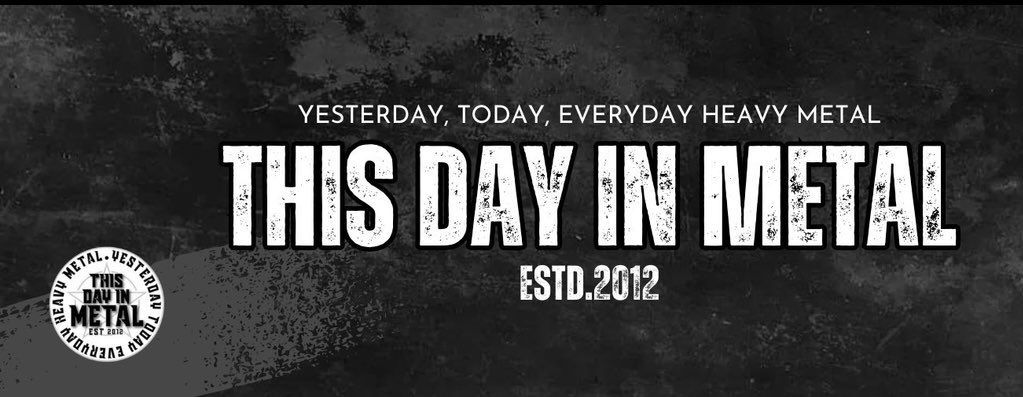
Do you agree with my decision? Who do you think should have won? Cast your vote on the poll below, leave your comments on our social media, and your suggestions who you think should step in the ring next. I’m Justin, your friendly neighborhood metalhead, for This Day in Metal and this has been Versus.
Want to be notified of the latest metal albums, news and interviews? Sign up here!